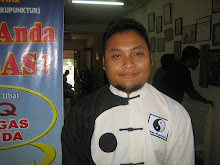Friday, May 13, 2011
Effect of Acupuncture on Allergen -Induced Basophil
Effect of Acupuncture on Allergen-Induced Basophil Activation in Patients with Atopic Eczema
Pfab F, et al. Department of Dermatology and Allergy, Technische Universität München , Munich, Germany.
The crucial symptom of atopic eczema is itch. Acupuncture has been shown to exhibit a significant effect on experimental itch; however, studies focusing on clinical itch in atopic eczema and corresponding mechanisms are lacking. The study design was a unicenter, single-blinded (observer), prospective, randomized clinical pilot trial with an additional experimental part. In 10 patients with atopic eczema, we investigated the effect of acupuncture treatment (n = 5) compared to no treatment (n = 5) on itch intensity and in vitro basophil CD63 expression upon allergen stimulation (house dust mite and timothy grass pollen) in a pilot trial. Results: Mean itch intensity in a visual analog scale was rated significantly lower in the acupuncture group (-25% ± 26% [day 15-day 0]; -24% ± 31% [day 33-day 0]) than in the control group (15% ± 6% [day 15-day 0]; 29% ± 9% [day 33-day 0]). From day 0 (before treatment) to day 15 (after 5 acupuncture treatments) as well as day 33 (after 10 acupuncture treatments), the acupuncture group showed less CD63 positive basophils than the control group regarding stimulation with house dust mite and grass pollen allergen at various concentrations (5 ng/mL, 1 ng/mL, 0.5 ng/mL, or 0.25 ng/mL). Conclusions: Our results show a reduction of itch intensity and of in vitro allergen-induced basophil activation in patients with atopic eczema after acupuncture treatment. Reducing basophil activation can be a further tool in investigating the mechanisms of action of acupuncture in immunoglobulin E-mediated allergy. Due to the limited number of patients included in our pilot trial, further studies are needed to strengthen the hypothesis.
J Altern Complement Med. 2011 Apr;17(4):309-14. Epub 2011 Mar 28.
Source: PubMed
Pfab F, et al. Department of Dermatology and Allergy, Technische Universität München , Munich, Germany.
The crucial symptom of atopic eczema is itch. Acupuncture has been shown to exhibit a significant effect on experimental itch; however, studies focusing on clinical itch in atopic eczema and corresponding mechanisms are lacking. The study design was a unicenter, single-blinded (observer), prospective, randomized clinical pilot trial with an additional experimental part. In 10 patients with atopic eczema, we investigated the effect of acupuncture treatment (n = 5) compared to no treatment (n = 5) on itch intensity and in vitro basophil CD63 expression upon allergen stimulation (house dust mite and timothy grass pollen) in a pilot trial. Results: Mean itch intensity in a visual analog scale was rated significantly lower in the acupuncture group (-25% ± 26% [day 15-day 0]; -24% ± 31% [day 33-day 0]) than in the control group (15% ± 6% [day 15-day 0]; 29% ± 9% [day 33-day 0]). From day 0 (before treatment) to day 15 (after 5 acupuncture treatments) as well as day 33 (after 10 acupuncture treatments), the acupuncture group showed less CD63 positive basophils than the control group regarding stimulation with house dust mite and grass pollen allergen at various concentrations (5 ng/mL, 1 ng/mL, 0.5 ng/mL, or 0.25 ng/mL). Conclusions: Our results show a reduction of itch intensity and of in vitro allergen-induced basophil activation in patients with atopic eczema after acupuncture treatment. Reducing basophil activation can be a further tool in investigating the mechanisms of action of acupuncture in immunoglobulin E-mediated allergy. Due to the limited number of patients included in our pilot trial, further studies are needed to strengthen the hypothesis.
J Altern Complement Med. 2011 Apr;17(4):309-14. Epub 2011 Mar 28.
Source: PubMed
Subscribe to:
Post Comments (Atom)





No comments:
Post a Comment